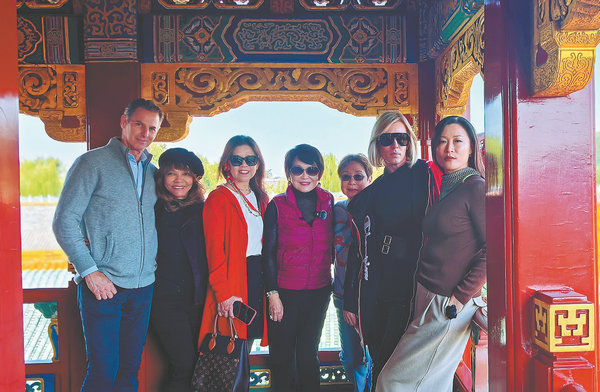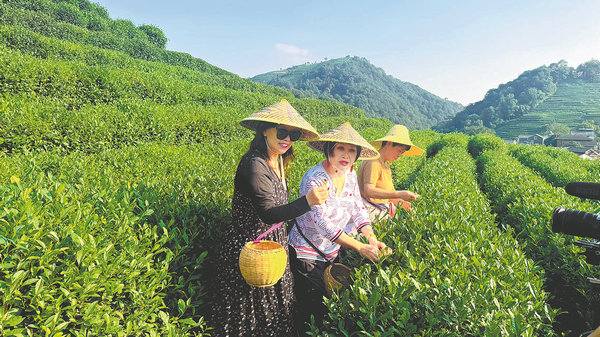Celebrity leads a group of Americans on a fruitful, culinary expedition
China Daily, November 08, 2024 Adjust font size:

A culinary expedition to any country offers food for thought but visiting China on such an endeavor also ensures great taste and memories.
Six American participants undertook such an expedition with an immersive 10-day trip to Shanghai, Hangzhou in Zhejiang province, and Beijing last month. Led by renowned television host and entrepreneur Yue-sai Kan, a Chinese-American, co-chair of the China Institute in America, their journey highlighted the rich culinary traditions and historical landmarks of China, blending fine dining with cultural exploration.
The participants came from various professions, including Jenny Cohen, founder and CEO of Lush Decor Home, and Peggy Cowell, founder of Kaiulani Spices in Hawaii. Despite their diverse backgrounds, they shared "a common lack of familiarity with China". "Some of these guests had visited China many years ago, but there was still a gap in their understanding," says Kan, a well-known fashion icon.
"This culinary trip offered an opportunity to update their impressions of China. It turned out to be a wonderful journey — they kept praising how clean and safe China is. When these American guests first tried Chinese hairy crabs, their eyes lit up. October is the best season to taste the crabs, and it is also an ideal time to visit China."
The restaurants were carefully chosen: Each not only showcased the exquisite flavors of signature dishes and well-crafted environments, but also introduced local culture to the travelers, according to Kan.
A standout moment was dining at Heavenly Jin, the world's "highest restaurant in a building", on the 120th floor of the J Hotel, Shanghai Tower, where they savored refined Huaiyang cuisine (a traditional Chinese cuisine from Huai'an and Yangzhou of Jiangsu province), while enjoying a panoramic view of the city's skyline. This experience gave the guests a deeper understanding of Shanghai as China's bustling economic and cultural hub, Kan adds.

In Hangzhou's Longjing village, renowned for its world-famous green tea, Kan and her guests enjoyed a blend of tranquility and excitement. They immersed themselves in a tea ceremony, personally picking tea leaves and delving into the rich culture of Chinese tea.
In Beijing, participants were treated to imperial-style banquets at Gvsai Beise Mansion and Family Li Imperial Cuisine, where they gained insights into the ancient culinary traditions once reserved for royalty. "The imperial-style banquets in Beijing were a dream," says Lynn Lee, quality control engineer at an American biotechnology company. "Eating in historical settings and learning the stories behind each dish was an immersive experience."
As the host, Kan also led the guests in hands-on experience. As many people, especially young Chinese, enjoy wearing traditional clothing, Kan and one of her guests, Allan Pollack, a US real estate investor, tried on costumes which were in vogue during the Qing Dynasty (1644-1911) at the Temple of Heaven. "The Qing Dynasty cosplay at the Temple of Heaven was unforgettable. It was challenging to be an empress with the crown falling off all the time," she recalls. "Wearing the costume and wandering in the historic landmark made history feel alive."
Founded in 1926, the China Institute in America is a nonprofit cultural organization, which introduces Chinese culture and civilization to enhance mutual understanding between the peoples of China and the United States through various educational and promotional activities.
Kan has ventured into many careers throughout her life, striving to promote cultural exchange and to "bridge Chinese and American cultures".
Born in 1947, she started her television shows Looking East and One World in the 1970s. In 1992, she launched a cosmetic line Yue Sai, and her own image, with black hair and red lips, helped her garner millions of fans and customers. Today, she also works on new media programs, and the entire culinary journey was professionally recorded and will be aired on the Yue-sai Kan One World Foundation's social media channels, giving global audiences a chance to experience this trip.
Kan says that she is glad to be a recorder of the times, continuing to work on communication between the East and the West.